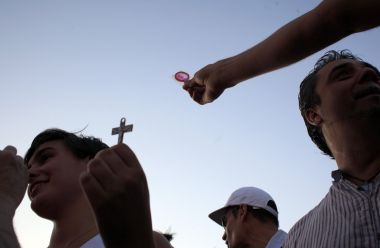The surprising beliefs of US Catholics

Large majorities of Catholics in the United States believe that "new" forms of family life such as single or gay and lesbian parenting are acceptable.
A new survey from Pew Research show nine in ten still believe a married mother and father is the ideal model to raise children.
However, many think other models, such as unmarried parents living together, divorced parents, single parents or gay and lesbian parents are still "acceptable".
The new analysis on American Catholics' views on family life, sexuality and Catholic identity comes as Pope Francis prepares to visit Cuba and the US at the end of this month, culminating in a large Mass at the World Meeting of Families in Philadelphia. On Tuesday, Pope Francis issued a statement about the coming jubilee "Year of Mercy", indicating more understanding for women who have had abortions, which is taught by the church to be a crime equivalent to murder.
According to the Pew survey, a quarter of Catholics have been divorced. One in ten have divorced and remarried, which according to Church doctrine means they can no longer receive communion if their first marriage was not annulled.
A tenth are living with a partner. Nearly half have lived with a partner they are not married to at some point in their lives.
Catholics who have been divorced and decide not to marry again but just to live with a new partner are not denied access to the sacrament of communion.
Most US Catholics disagree with their Church's ban on artificial birth control and are divided on the question of whether the church should recognise gay marriage.
However, in spite of these conflicts, they remain devoted to the Church. Seven in ten say they cannot ever imagine leaving the church. Nearly six in ten Catholics agree that abortion is a sin, and more than half say devotion to Mary and receiving the sacraments are "essential" to what being Catholic means to them personally.
The survey also shows the depth of the Catholic faith in the US. As many as 45 per cent of Americans are connected to Catholicism in some way, including one-fifth who claim the faith as their current religion, one-tenth who were raised in the faith and have now fallen away, and a similar number who maintain a cultural connection to Catholicism.
The latter group, "cultural Catholics", do not identify Catholicism as their religion and most are either Protestants or have no religion. But they claim to identify with Catholic or partially Catholic ways: one-third say they sometimes attend Mass, and some lapsed Catholics can see themselves returning to the faith in the future.
The survey also shows the difficulties Pope Francis faces in getting across the environmental message of his encyclical Laudato Si. Six out of ten Catholics agree with him on working to help the poor, but just half that number say the same on climate change. Large majorities say it is not a sin to live in a house larger than needed or to use energy without concern for the impact on the environment. Hispanic Catholics are much more likely than the non-Hispanic to be concerned about the morality of excessive consumption.
Pew Research surveyed 5,122 adults, including more than 1,000 self-identified Catholics.











